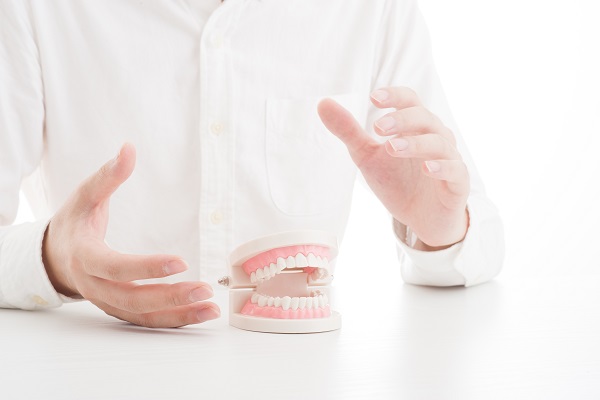Getting Dentures to Replace Missing Teeth

If you are missing one or more teeth, you have several tooth replacement options from which to choose. One such option is dentures. Though dentures are no longer the preferred tooth replacement option for neither dentists nor patients, they continue to have a purpose. For some people, dentures are the only option. For others, they offer the affordability that other, more intensive restoration methods, such as implants, cannot provide. Regardless of your reason for choosing dentures, there are a few things you should know about this common prosthetic.
Types of dentures
Dentures fall into two main categories: complete and partial. Which type a dentist recommends depends on how many teeth a patient is missing and whether the teeth adjacent to the gap are healthy.
A complete denture is designed to replace all the teeth in a single upper or lower arch. A partial denture, on the other hand, can help to replace anywhere from one to a handful of teeth. Partial dentures utilize ceramic or metal clasps, which anchor onto healthy teeth that are adjacent to the gap.
In some cases, dentists recommend a hybrid approach that utilizes both dentures and implants. They refer to such a setup as “implant-supported dentures.” With implant-supported dentures, a dentist may install one or two implants adjacent to a gap to serve as support for a partial denture. Implant-supported dentures are more durable than standard full or partial dentures.
Living with dentures
Dentures require wearers to make significant adjustments to their lifestyles in the early days of use. They also require substantial care and maintenance. Below are just a few things tooth loss patients must understand about life with dentures.
Dentures affect speech
Teeth play a large role in how one speaks. When individuals lose teeth, their speech becomes impaired. While dentures help to correct speech hindered by missing teeth, they often make it difficult for wearers to talk for the first few months. This is because dentures sit loosely along the gum line and shift around as the mouth moves. As a result, wearers must practice talking in the early days of denture use.
Dentures affect diet
Though dentures resemble teeth, they are much weaker than the real deal. Also, because of how they are constructed, they make it difficult for wearers to chew their food comfortably or effectively. As a result, dentists recommend that denture patients stick to soft foods they can chew easily.
Dentures affect oral health
Again, though dentures resemble teeth, they are far from capable of providing the benefits that actual teeth and implants offer. One such benefit is jaw and bone support. After as few as six months of wear, the jawbone may begin to deteriorate and the gums to shrink. Either occurrence can cause dentures to become ill-fitting and for any remaining natural teeth to become loose and fall out. To help with the loose-fitting dentures, patients must undergo fittings for new sets every six months to a year. There is little a dentist can do to correct a shrunken jawbone, though.
Conclusion
Dentures are a common and effective tooth replacement option. If you are interested a complete or partial set, discuss the pros and cons with your dentist today.
Request an appointment here: https://www.igortkachukdds.com or call Igor Tkachuk DDS at (718) 416-6422 for an appointment in our Staten Island office.
Check out what others are saying about our dental services on Yelp: Dentures in Staten Island, NY.
Related Posts
While dentists strive to save natural teeth whenever possible, certain situations may require tooth extractions to preserve oral health. When severe damage, decay, infection, or other oral health issues threaten the health of your smile, an extraction can save it. It is important patients recognize the signs of trouble and seek treatment promptly.Extensive tooth decay…
Gum disease treatment can restore health to the smile. A family dentist — who often provides cosmetic services in addition to general dental care — offers targeted solutions based on the severity and progression of gum disease. Early detection and prompt intervention can halt or reverse the condition. Exploring how family dentists treat gum disease…
A deep cleaning is an essential dental procedure designed to address plaque and tartar buildup below the gumline. Unlike routine cleanings, this treatment targets early signs of gum disease and helps restore oral health before more advanced problems occur. Understanding why a deep cleaning is necessary and what the process involves helps patients feel more…
Finding a "dentist near me" in your area who best fits your needs can be challenging, especially with the variety of options available. This decision will help you maintain good oral health and ensure a positive experience with dental care. The following guide will provide useful tips for identifying a qualified and reputable general dentist…
